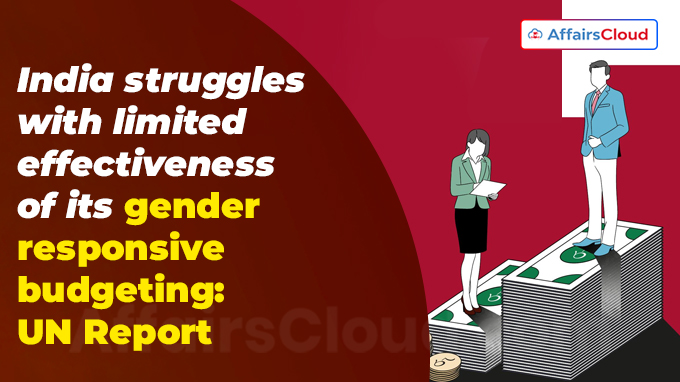 According to the United Nation(UN) report titled “Charting New Paths for Gender Equality and Empowerment: Asia-Pacific Region Report on Beijing +30 Review”, India struggles with limited effectiveness of its Gender Responsive Budgeting (GRB) due to the lack of sex-disaggregated data and exclusion of key programmes that benefit women.
According to the United Nation(UN) report titled “Charting New Paths for Gender Equality and Empowerment: Asia-Pacific Region Report on Beijing +30 Review”, India struggles with limited effectiveness of its Gender Responsive Budgeting (GRB) due to the lack of sex-disaggregated data and exclusion of key programmes that benefit women.
- The report was published jointly by the UN Economic and Social Commission for Asia and the Pacific (UNESCAP) and UN Women at the ‘Asia-Pacific Ministerial Conference on the Beijing+30 Review’ held in Bangkok, Thailand.
- The report has analysed how countries in the Asia-Pacific region are placed compared to the Sustainable Development Goals (SDG) adopted in Beijing, China 30 years back underscored the adoption of GRB by Asia-Pacific countries like India shows their strong commitment to ensuring the efficient allocation of resources based on the identified needs of women and girls, but has also outlined certain challenges.
About the Report:
i.The report provides an in-depth insight of the progress made and gaps in implementing the Beijing Declaration and Platform for Action (BPfA) in Asia-Pacific region.
Note: BPfA is a global framework which was adopted by countries across the world in 1995, for advancing gender equality and the empowerment of women and girls.
ii.The report aims to identify opportunities to address gender inequalities and frame future policies and programmes that can bring gender-centric transformative changes for all women and girls of diverse backgrounds in the Asia-Pacific region.
iii.The report is structured into 6 thematic areas, including poverty reduction and human capital development, shared prosperity and decent work, freedom from gender-based violence, meaningful participation and gender-responsive governance, peaceful and just societies,and gender and the environment.
Key Findings:
i.The report has suggested that the Government of India (GoI) should enhance the Gender Budget Statement and establish robust monitoring mechanisms through the Ministry of Women and Child Development (MoWCD) and Ministry of Finance (MoF) to strengthen the quality of GRB.
ii.It has recommended to integrate GRB considerations during the budget prioritization phase; and should promote local governments to adopt GRB practices. These practices would help to achieve the ultimate goal of ensuring the participation of the most vulnerable groups of women in planning and budgeting purposes.
iii.The report highlighted that other than India, the Philippines acknowledged the importance of integrating a gender perspective into the public financial management system in promoting gender equality and women’s empowerment.
- It has outlined certain obstacles faced by the Philippines in implementation of GRB such as: uneven capacities among Gender and Development focal points, inadequate monitoring of expenditures and underutilization of the Gender and Development budget by key agencies and local leaders.
About Asia-Pacific Ministerial Conference on the Beijing +30 Review:
i.It was organised jointly by the UN ESCAP and UN Women from 19th November to 21st November, 2024 in Bangkok, Thailand.
ii.It has brought together over 1,200 delegates from governments, civil society and youth groups, the private sector and academia to discuss progress and priority actions to support gender equality and women’s empowerment.
Key Points:
i.During the Asia-Pacific Ministerial Conference, the GoI informed that there has been a 218% decadal increase in gender budgeting in the country.
ii.Preetam B. Yashwant, Joint Secretary, MoWCD who represented India at the conference highlighted that the GoI has allocated USD 37 million for the gender budgeting for Financial Year 2024-25 (FY25).
iii.India at a separate side-event at the conference demonstrated that India’s implementation of Beijing SDG is guided by the women-led development model by highlighting the leadership of women in Panchayati Raj Institutions and Urban Local Bodies (ULBs) due to 33% reservation as well as collective efforts of Self-Help Groups (SHGs) have significantly contributed to their financial empowerment.
About United Nations Economic and Social Commission for Asia and the Pacific (UNESCAP):
It is one of the 5 regional commissions of the United Nations Economic and Social Council (ECOSOC).
Executive Secretary- Armida Salsiah Alisjahbana
Headquarters- Bangkok, Thailand
Established- 1947




